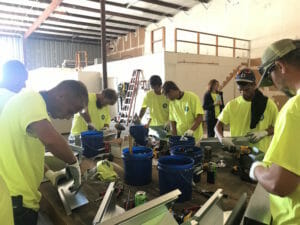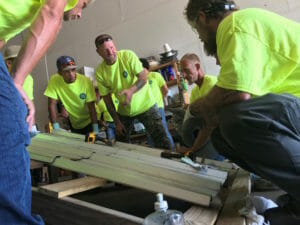When looking for a commercial roofer, there are plenty of things to consider, such as price, reputation, and experience. But, often overlooked are the benefits of finding a commercial roofer with a full-service approach.
Most roofing companies can only handle roof construction and repairs. These companies have to hire middlemen and vendors to fabricate the metal parts of any roof they construct, and they rarely have the resources to keep up with preventative maintenance. A full-service company, like Maxwell Roofing & Sheet Metal, Inc., is a partner in every aspect of roofing and provides everything you need for the entire life of your roof—all under one…well, roof.
5 Benefits of a Full-Service Commercial Roofing Approach
Fabrication
No matter the size, all commercial roofs start with one main component: sheet metal. Light-gauge industrial sheet metal is the most efficient, durable, and cost-effective material for building roofs, but most roofing companies have to buy it from a vendor. Full-service roofers cut out the middleman and fabricate their own sheet metal components, speeding up construction and passing on a lower cost to customers.
Customization and Design
Through in-house fabrication, full-service roofers are able to design and produce custom components faster and cheaper than other companies. By eliminating a third-party fabricator, full-service roofers are able to ensure that every component is specially-designed for the roof they install and not just modified from a generic design. Some full-service companies, like Maxwell Roofing, even offer free design services and create prototypes to eliminate mistakes in design.
Construction
Like any roofing company, full-service roofers have an experienced construction team. But, roofers who rely on outside fabrication and design may experience hold ups or complications that delay construction or add costs. Full-service roofers are able to partner with the customer from the very beginning to ensure timely scheduling and communication and eliminate unwelcome surprises when building a new roof, replacing a roof, or creating a roof recover system.
Maintenance
As a critical part of a building’s structure, a roof isn’t something you can just build and forget. Like any complicated system, commercial roofs need maintenance. The best full-service roofers have a proactive maintenance management program, like MAXCare. MAXCare starts with a roofing assessment and produces an industry-leading report with maintenance planning, recommendations, and forecasting for future repairs.
Emergency Service
Even regularly-maintained roofs can experience unexpected damage, and full-service roofers are equipped to quickly respond to emergencies. Maxwell Roofing has an entire service team available to repair your roof 24 hours a day, seven days a week.
Who Needs Full-Service Commercial Roofing?
Full-service commercial roofing is for any customer who wants to save money and time on roof construction by doing it right the first time, as well as anyone with a project that requires a high level of customization. Trying to piece together all the parts of a roof with different contractors is a huge headache for project managers and general contractors, while a full-service company can handle everything from construction through the whole life of the roof.
Getting Started with a Full-Service Commercial Roofer
When choosing a full-service commercial roofer, it’s important to consider the company’s experience, reputation, and services. Maxwell Roofing has nearly 70 years of experience and leads the industry in quality and service.
Contact Maxwell Roofing today to get started on your roofing project.



